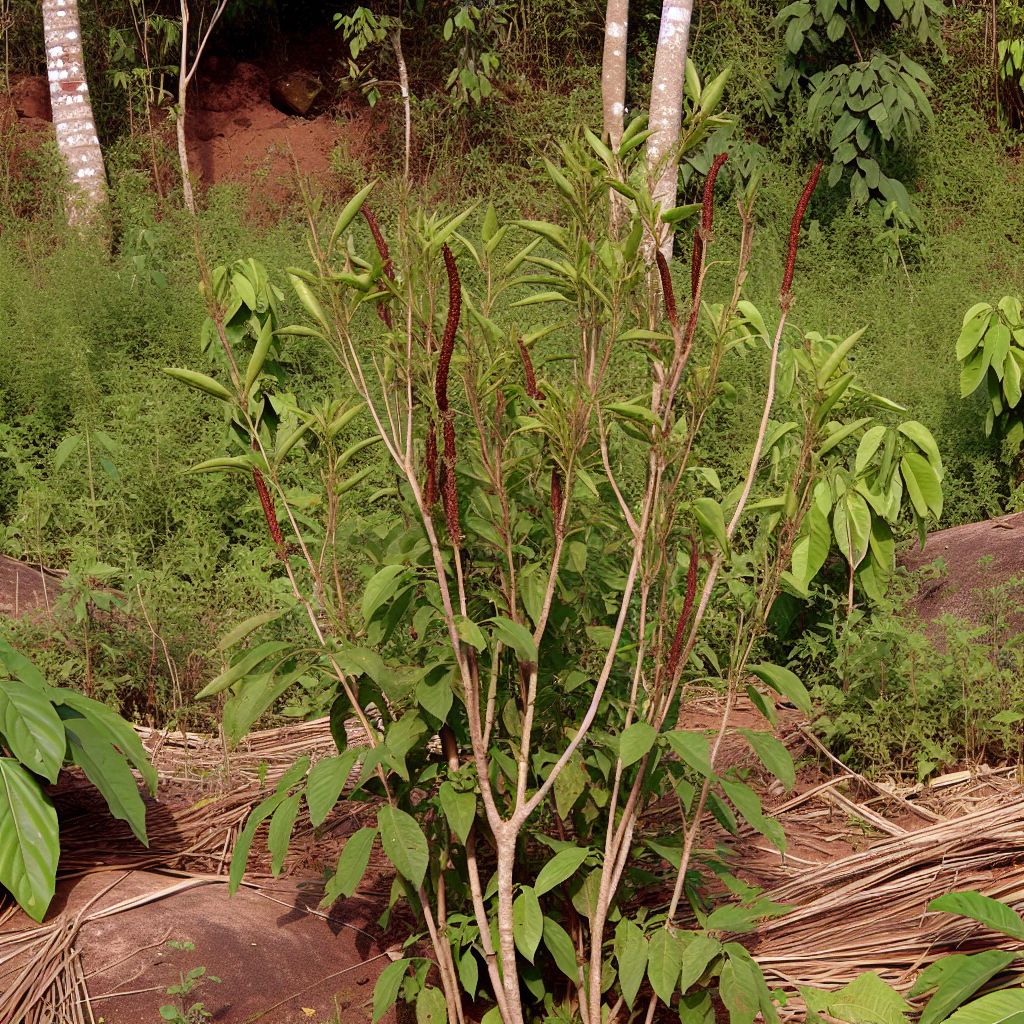Deutsch: Gewürzpflanze / Español: Planta aromática / Português: Planta condimentar / Français: Plante aromatique / Italiano: Pianta speziata
Spice plant refers to any plant that is grown or harvested primarily for the spices or seasonings that can be derived from its various parts, including leaves, seeds, berries, bark, or roots. These plants are valued for their ability to add flavor, aroma, and sometimes even preservation qualities to food.
Description

Spice plants play a significant role in both culinary traditions and the global economy. They have been cultivated and traded for thousands of years, with historical evidence pointing to spice trade routes that connected ancient civilizations across continents. In the environmental context, the cultivation and harvesting of spice plants can have both positive and negative impacts. On the positive side, sustainable farming practices of spice plants can contribute to biodiversity, soil health, and the preservation of traditional agricultural practices. Many spice plants can be grown in mixed cultivation systems that mimic natural ecosystems, supporting a variety of species and reducing the need for chemical inputs.
However, there are environmental concerns associated with the cultivation of spice plants, especially when it involves large-scale monocultures or the overharvesting of wild species. Such practices can lead to deforestation, loss of biodiversity, and soil degradation. Additionally, the use of pesticides and fertilizers in conventional spice farming can contribute to water pollution and harm non-target organisms.
Application Areas
Spice plants are utilized in a variety of fields beyond just culinary applications, including:
- Medicine: Many spices have been used in traditional medicine for their health benefits, including anti-inflammatory, antimicrobial, and antioxidant properties.
- Cosmetics: Essential oils derived from spice plants are often used in cosmetics and personal care products for their fragrances and therapeutic properties.
- Agriculture: Some spice plants, like those from the chili pepper family, are used in natural pest control methods.
Well-Known Examples
Some well-known spice plants include:
- Black pepper (Piper nigrum): Native to India, it is the world's most traded spice.
- Cinnamon (Cinnamomum spp.): Obtained from the inner bark of several tree species from the genus Cinnamomum.
- Vanilla (Vanilla planifolia): The second most expensive spice after saffron, derived from orchids of the genus Vanilla.
Treatment and Risks
The main environmental risks associated with spice plant cultivation include:
- Deforestation: In some regions, forests are cleared to make way for spice plantations, which can lead to loss of biodiversity.
- Soil degradation: Overuse of chemical inputs and poor agricultural practices can degrade soil quality.
- Water pollution: Runoff from farms using pesticides and fertilizers can pollute water bodies.
Efforts to mitigate these impacts include adopting organic farming practices, implementing fair trade policies to ensure sustainable livelihoods for farmers, and promoting agroforestry systems that integrate spice plants with other crops to enhance biodiversity.
Similar Terms or Synonyms
- Herb plants (in the context of culinary herbs)
- Aromatic plants
Weblinks
- umweltdatenbank.de: 'Gewürzpflanze' im Lexikon der umweltdatenbank.de (German)
- umweltdatenbank.de: 'Gewürzpflanze' im Lexikon der umweltdatenbank.de (German)
Summary
Spice plants, while primarily known for their culinary uses, also have significant environmental implications. Sustainable cultivation practices are crucial for minimizing negative impacts on the environment and promoting biodiversity, soil health, and water quality. The cultural and economic importance of spice plants underscores the need for sustainable management of these valuable resources.
--
Related Articles to the term 'Spice plant' | |
| 'Spice' | ■■■■■■■■ |
| A spice is a dried seed, fruit, root, bark, or vegetable substance primarily used for flavoring, coloring . . . Read More | |
| 'Ginger' | ■■■■■■■ |
| Ginger or ginger root is the rhizome of the plant Zingiber officinale, consumed as a delicacy, medicine, . . . Read More | |
| 'Cinnamon' | ■■■■■■■ |
| Indian: KaruvapattaCinnamon is a spice obtained from the inner bark of several trees from the genus Cinnamomum . . . Read More | |
| 'Flavor' | ■■■■■■■ |
| Flavor (American English), flavour (British English), or taste is the perceptual impression of food or . . . Read More | |
| 'Cumin' | ■■■■■■ |
| Indian: JeerakamCumin is a flowering plant in the family Apiaceae, native from the east Mediterranean . . . Read More | |
| 'Fenugreek' | ■■■■■■ |
| Indian: PerinjeerakamFenugreek is an annual plant in the family Fabaceae with leaves consisting of three . . . Read More | |
| 'Inji' | ■■■■■■ |
| Inji, commonly known as ginger, is a versatile and widely used spice and herb in the culinary world. . . . Read More | |
| 'Aroma' | ■■■■■■ |
| Aroma is referring to the fragrance produced by freshly brewed coffee. Like body, flavor, and acidity, . . . Read More | |
| 'Aceite' | ■■■■■■ |
| Aceite is the Spanish word for any kind of edible "Oil". Among the Edible oils used for cooking are: . . . Read More | |
| 'Crabapples' | ■■■■■■ |
| Crab Apple which is also spelled Crabapple is one of the common varieties of apple which are not generally . . . Read More | |
